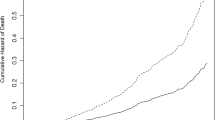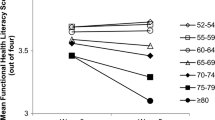Abstract
Background
Low health literacy and low cognitive abilities both predict mortality, but no study has jointly examined these relationships.
Methods
We conducted a prospective cohort study of 3,260 community-dwelling adults age 65 and older. Participants were interviewed in 1997 and administered the Short Test of Functional Health Literacy in Adults and the Mini Mental Status Examination. Mortality was determined using the National Death Index through 2003.
Measurements and Main Results
In multivariate models with only literacy (not cognition), the adjusted hazard ratio was 1.50 (95% confidence of interval [CI] 1.24–1.81) for inadequate versus adequate literacy. In multivariate models without literacy, delayed recall of 3 items and the ability to serial subtract numbers were associated with higher mortality (e.g., adjusted hazard ratios [AHR] 1.74 [95% CI 1.30–2.34] for recall of zero versus 3 items, and 1.32 [95% CI 1.09–1.60] for 0–2 vs 5 correct subtractions). In multivariate analysis with both literacy and cognition, the AHRs for the cognition items were similar, but the AHR for inadequate literacy decreased to 1.27 (95% CI 1.03 – 1.57).
Conclusions
Both health literacy and cognitive abilities independently predict mortality. Interventions to improve patient knowledge and self-management skills should consider both the reading level and cognitive demands of the materials.

Similar content being viewed by others
References
Baker DW, Wolf MS, Feinglass JM, Thompson JA, Gazmararian JA, Huang J. Health literacy and mortality among elderly persons. Arch Intern Med. 2007;167:1503–9.
Parker RM, Baker DW, Williams MV, Nurss JR. The test of functional health literacy in adults: a new instrument for measuring patients’ literacy skills. J Gen Intern Med. 1995;10:537–41.
Baker DW, Williams MV, Parker RM, Gazmararian JA, Nurss J. Development of a brief test to measure functional health literacy. Patient Educ Couns. 1999;38:33–42.
Barnes DE, Tager IB, Satariano WA, Yaffe K. The relationship between literacy and cognition in well-educated elders. J Gerontol. 2004;59A:390–5.
Manly JJ, Schupf N, Tang MX, Stern Y. Cognitive decline and literacy among ethnically diverse elders. J Geriatr Psychiatry Neurol. 2005;18:213–7.
Deary IJ, Batty D, Gottfredson LS. Human hierarchies, health, and IQ. Science. 2005;309:703.
Beier ME, Ackerman PL. Determinants of health knowledge: an investigation of age, gender, abilities, personality, and interests. J Pers Soc Psychol. 2003;84:439–48.
Insel K, Morrow D, Brewer B, Figueredo A. Executive function, working memory, and medication adherence among older adults. J Gerontol B Psychol Sci Soc Sci. 2006;61:102–107.
Stilley CS, Sereika S, Muldoon MF, Ryan CM, Dunbar-Jacob J. Psychological and cognitive function: predictors of adherence with cholesterol lowering treatment. Ann Behav Med. 2004;27:117–24.
Pavlik VN, de Moraes SA, Szklo M, Knopman DS, Mosley TH, Hyman DJ. Relation between cognitive function and mortality in middle-aged adults. Am J Epidemiol. 2003;157:327–34.
Hart CL, Taylor MD, Smith GD, et al.. Childhood IQ, social class, deprivation, and their relationships with mortality and morbidity risk in later life: prospective observational study linking the Scottish Mental Survey 1932 and the Midspan studies. Psychosom Med. 2003;65:877–83.
Shipley BA, Der G, Taylor MD, Deary IJ. Cognition and all-cause mortality across the entire adult age range: Health and Lifestyle survey. Pcychosom Med. 2006;68:17–24.
Gazmararian JA, Baker DW, Williams MV, et al.. Health literacy among Medicare enrollees in a managed care organization. JAMA. 1999;281:545–51.
Ware JE. The MOS 36-item Short Form Health Survey (SF-36). In: Sederer LI, Dickey B, eds. Outcomes Assessment in Clinical Practice. Baltimore, MD: Williams and Wilkins; 1996:61–4.
Folstein MF, Folstein SE, McHugh PR. “Mini-mental state": a practical method for grading the cognitive state of patients for the clinician. J Psychiatr Res. 1975;12:189–98.
Jorm AF, Scott R, Henderson AS, Kay DW. Educational level differences on the Mini-Mental State: the role of test bias. Psychol Med. 1988;18:727–31.
Baddeley A. The fractionation of working memory. Proc Natl Acad Sci U S A. 1996;93:13468–72.
Chandler P, Sweller J. Cognitive load theory and the format of instruction. Cogn Instr. 1991;8:293–332.
Baker DW, Gazmararian JA, Sudano J, Patterson M, Parker RM, Williams MV. Health literacy and performance on the Mini-Mental State Examination. Aging Ment Health. 2002;6:22–9.
Mayer RE, ed.. The Cambridge Handbook of Multimedia Learning. New York: Cambridge University Press; 2006.
Acknowledgments
This work was supported by grant number R01 AB026393-01 from the National Institute on Aging. Dr. Wolf received support from a Centers for Disease Control and Prevention Career Development Award (K01 EH000067-01).
Contributions of Authors
We declare that we participated in the following:
Obtaining funding—Baker, Feinglass, Wolf; obtaining data and determining deaths from the National Death Index—Feinglass, Baker; analysis of the data and interpretation of the results—Baker, Wolf, Feinglass, Thompson; drafting of the manuscripts—Baker, Wolf, Feinglass; critical feedback and suggested revisions—Thompson.
Conflict of Interest
None disclosed.
Role of the Funding Source
The funding source (the National Institute on Aging) for this project played no role in the project.
Author information
Authors and Affiliations
Corresponding author
Rights and permissions
About this article
Cite this article
Baker, D.W., Wolf, M.S., Feinglass, J. et al. Health Literacy, Cognitive Abilities, and Mortality Among Elderly Persons. J GEN INTERN MED 23, 723–726 (2008). https://doi.org/10.1007/s11606-008-0566-4
Received:
Revised:
Accepted:
Published:
Issue Date:
DOI: https://doi.org/10.1007/s11606-008-0566-4




